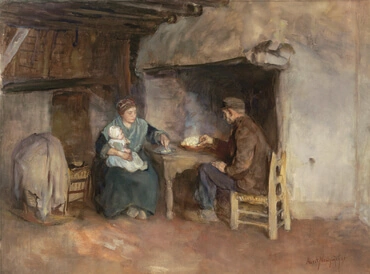1
Y HABITO Jacob en la tierra donde peregrinó su padre, en la tierra de Canaán.
2
Estas fueron las generaciones de Jacob. José, siendo de edad de diez y siete años apacentaba las ovejas con sus hermanos; y el joven estaba con los hijos de Bilha, y con los hijos de Zilpa, mujeres de su padre: y noticiaba José á su padre la mala fama de
3
Y amaba Israel á José más que á todos sus hijos, porque le había tenido en su vejez: y le hizo una ropa de diversos colores.
4
Y viendo sus hermanos que su padre lo amaba más que á todos sus hermanos, aborrecíanle, y no le podían hablar pacíficamente.
5
Y soñó José un sueño y contólo á sus hermanos; y ellos vinieron á aborrecerle más todavía.
6
Y él les dijo: Oíd ahora este sueño que he soñado:
7
He aquí que atábamos manojos en medio del campo, y he aquí que mi manojo se levantaba, y estaba derecho, y que vuestros manojos estaban alrededor, y se inclinaban al mío.
8
Y respondiéronle sus hermanos: ¿Has de reinar tú sobre nosotros, ó te has de enseñorear sobre nosotros? Y le aborrecieron aún más á causa de sus sueños y de sus palabras.
9
Y soñó aún otro sueño, y contólo á sus hermanos, diciendo: He aquí que he soñado otro sueño, y he aquí que el sol y la luna y once estrellas se inclinaban á mí.
10
Y contólo á su padre y á sus hermanos: y su padre le reprendió, y díjole: ¿Qué sueño es este que soñaste? ¿Hemos de venir yo y tu madre, y tus hermanos, á inclinarnos á ti á tierra?
11
Y sus hermanos le tenían envidia, mas su padre paraba la consideración en ello.
12
Y fueron sus hermanos á apacentar las ovejas de su padre en Sichêm.
13
Y dijo Israel á José: Tus hermanos apacientan las ovejas en Sichêm: ven, y te enviaré á ellos. Y él respondió: Heme aquí.
14
Y él le dijo: Ve ahora, mira cómo están tus hermanos y cómo están las ovejas, y tráeme la respuesta. Y enviólo del valle de Hebrón, y llegó á Sichêm.
15
Y hallólo un hombre, andando él perdido por el campo, y preguntóle aquel hombre, diciendo: ¿Qué buscas?
16
Y él respondió: Busco á mis hermanos: ruégote que me muestres dónde pastan.
17
Y aquel hombre respondió: Ya se han ido de aquí; yo les oí decir: Vamos á Dothán. Entonces José fué tras de sus hermanos, y hallólos en Dothán.
18
Y como ellos lo vieron de lejos, antes que cerca de ellos llegara, proyectaron contra él para matarle.
19
Y dijeron el uno al otro: He aquí viene el soñador;
20
Ahora pues, venid, y matémoslo y echémosle en una cisterna, y diremos: Alguna mala bestia le devoró: y veremos qué serán sus sueños.
21
Y como Rubén oyó esto, librólo de sus manos y dijo: No lo matemos.
22
Y díjoles Rubén: No derraméis sangre; echadlo en esta cisterna que está en el desierto, y no pongáis mano en él; por librarlo así de sus manos, para hacerlo volver á su padre.
23
Y sucedió que, cuando llegó José á sus hermanos, ellos hicieron desnudar á José su ropa, la ropa de colores que tenía sobre sí;
24
Y tomáronlo, y echáronle en la cisterna; mas la cisterna estaba vacía, no había en ella agua.
25
Y sentáronse á comer pan: y alzando los ojos miraron, y he aquí una compañía de Ismaelitas que venía de Galaad, y sus camellos traían aromas y bálsamo y mirra, é iban á llevarlo á Egipto.
26
Entonces Judá dijo á sus hermanos: ¿Qué provecho el que matemos á nuestro hermano y encubramos su muerte?
27
Venid, y vendámosle á los Ismaelitas, y no sea nuestra mano sobre él; que nuestro hermano es nuestra carne. Y sus hermanos acordaron con él.
28
Y como pasaban los Midianitas mercaderes, sacaron ellos á José de la cisterna, y trajéronle arriba, y le vendieron á los Ismaelitas por veinte piezas de plata. Y llevaron á José á Egipto.
29
Y Rubén volvió á la cisterna, y no halló á José dentro, y rasgó sus vestidos.
30
Y tornó á sus hermanos y dijo: El mozo no parece; y yo, ¿adónde iré yo?
31
Entonces tomaron ellos la ropa de José, y degollaron un cabrito de las cabras, y tiñeron la ropa con la sangre;
32
Y enviaron la ropa de colores y trajéronla á su padre, y dijeron: Esta hemos hallado, reconoce ahora si es ó no la ropa de tu hijo.
33
Y él la conoció, y dijo: La ropa de mi hijo es; alguna mala bestia le devoró; José ha sido despedazado.
34
Entonces Jacob rasgó sus vestidos, y puso saco sobre sus lomos, y enlutóse por su hijo muchos días.
35
Y levantáronse todos sus hijos y todas sus hijas para consolarlo; mas él no quiso tomar consolación, y dijo: Porque yo tengo de descender á mi hijo enlutado hasta la sepultura. Y llorólo su padre.
36
Y los Midianitas lo vendieron en Egipto á Potiphar, eunuco de Faraón, capitán de los de la guardia.







